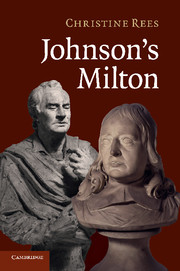Book contents
- Frontmatter
- Contents
- Acknowledgements
- List of abbreviations
- Introduction: Johnson and Milton
- PART I JOHNSON THE READER/WRITER: APPROPRIATING MILTON'S TEXTS
- PART II JOHNSON THE CRITIC: ASSESSING MILTON'S ACHIEVEMENT
- PART III JOHNSON THE BIOGRAPHER: CONSTRUCTING MILTON'S CHARACTER
- 8 ‘An acrimonious and surly republican’: Milton as political subject
- 9 ‘Domestick privacies’: Milton as private subject
- 10 Conclusion: ‘what other author ever soared so high?’
- Notes
- Select bibliography
- Index
8 - ‘An acrimonious and surly republican’: Milton as political subject
Published online by Cambridge University Press: 05 October 2010
- Frontmatter
- Contents
- Acknowledgements
- List of abbreviations
- Introduction: Johnson and Milton
- PART I JOHNSON THE READER/WRITER: APPROPRIATING MILTON'S TEXTS
- PART II JOHNSON THE CRITIC: ASSESSING MILTON'S ACHIEVEMENT
- PART III JOHNSON THE BIOGRAPHER: CONSTRUCTING MILTON'S CHARACTER
- 8 ‘An acrimonious and surly republican’: Milton as political subject
- 9 ‘Domestick privacies’: Milton as private subject
- 10 Conclusion: ‘what other author ever soared so high?’
- Notes
- Select bibliography
- Index
Summary
It has long been recognised that the seventeenth century was immensely important to Johnson throughout his life, from his childhood in Lichfield, a cathedral city scarred by the visible legacy of civil war, to his old age in riot-prone London, when fears of renewed civil disorder seemed all too justifiable. This hardly makes him exceptional. The recent traumatic and destabilising phase of British history, later conceptualised as the English Revolution, and the recurrent seismic shocks of the previous century from civil war itself to regicide and interregnum, restoration and further revolution, had tested the unwritten British constitution virtually to destruction, and brought to birth the written political theories that attempted to explain England/Britain to itself and identify its destiny. No wonder ‘the Spirits of the shady Night’, evoked by Marvell in his Horatian Ode, continued to haunt the dreams or nightmares of eighteenth-century political thinkers. To Johnson they usually manifest themselves as nightmare; nevertheless, the phantoms – especially, it might be said, that of Cromwell – fascinate him, and his sense of this complex period permeates his reading of Milton. In the ‘Life of Milton’, he constructs Milton as a political subject within his own understanding of seventeenth-century history, and from the sources of Milton's polemical prose and the earlier biographies.
Public interest in Milton's political prose can be plotted against a graph of public events, peaking at times when his arguments seem most urgently relevant to contemporary issues.
- Type
- Chapter
- Information
- Johnson's Milton , pp. 191 - 210Publisher: Cambridge University PressPrint publication year: 2010



